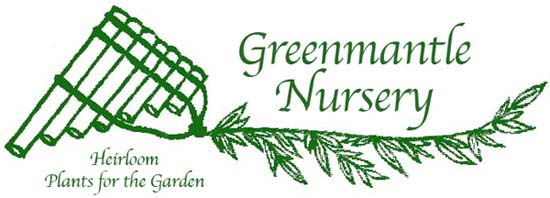|
Back when we first began our fruit collection, we purchased a number
of exotic apple trees from a prestigious specialty nursery in the Midwest.
Because they shipped their stock late in the season (April), most of
our new trees did not survive their first season in California. After
two consecutive years of bad luck, the owner offered to have his propagator
send us a "grafting order" of dormant benchgrafts - instead
of the customary one year trees. These grafts on MM111 did splendidly
and the resulting trees became part of our foundation stock.
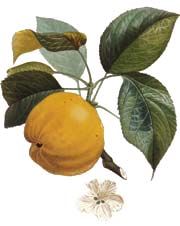
Calville Blanc |
One of the oldest, finest, and best loved apples of Europe -
This was grown under the name
Calville Blanc d'Hiver as early as 1592. The English know it as White Winter
Calville.
It adapts well to North American orchards and was appreciated by Thomas Jefferson
and
Albert Etter. Calville Blanc is extraordinary for it very high Vitamin C content.
Illustration by Pierre-Antoine Poiteau circa 1768. |
The experience led us to consider the possibility of making benchgrafts
a practical option for our own nursery customers. So for the past twenty
years, Greenmantle Nursery has pioneered in the development of retail
benchgraft orders. To make this work, we have focused on three aspects
of the process:
- We created an effective method of binding, sealing,
and reinforcing our grafts (usually whip-and-tongue) so that they
would have maximum strength and durability to withstand the rigors
of shipping and handling.
- We came up with some effective ways to pack
the grafting orders in varying quantities (from one to a thousand)
so that they were safely protected from potential damage in transit.
- We
prepared a detailed instruction sheet for benchgraft customers to
ensure the best possible aftercare and nurture.
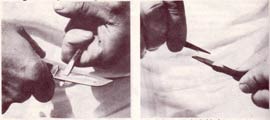
Preparing a whip-and -tongue
graft
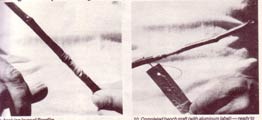
Wrapping and labeling the completed benchgraft
Of course, grafts will always be more fragile and problematic than
older trees; customers in a sense have to be willing to function as their
own nurserymen. We always encourage our customers to grow the grafts
out for a season in a protected nursery row or in containers before planting
them in the orchard. Nevertheless, some have ignored this advice and
still managed to succeed.
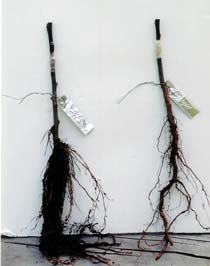
Apple
Benchgrafts (whip-and-tongue) ready for planting: Graft on left is MM111
rootstock (vigorous semi-dwarf); Graft on right is domestic apple seedling
rootstock (standard). Note multiple layers of wrapping material......
Despite the extra risk and trouble - the benchgraft option
has several important advantages:
- We can keep the grafts dormant significantly longer than our older
stock. This enables us to ship them at a time most advantageous to
customers in colder climates.
- Because the packages are significantly
smaller and lighter, freight costs become much more affordable. Express
air service (eg. UPS Three Day Select) is currently a routine option
for our "Back East" shipments.
- Customers who prefer Fall planting can put their personally nurtured
trees out in the orchard as soon as dormancy occurs. Here in coastal
California, our apple trees keep growing till the New Year; this
is why our shipping season doesn't start till January.....
- Where capital is limited, grafting orders provide customers the
opportunity to acquire more trees and/or varieties than normally possible.
- Options
for a diverse assortment of varieties and rootstocks are greatly
increased. As a small nursery, we are very limited in the number of
varieties and trees we can keep in inventory - we only propagate the
most popular varieties on a regular basis. A grafting order may be
the only way to get something different or rare. Also, we can offer
more rootstock options this way.
- It's fun... People are thrilled to watch their trees grow from
a minuscule graft. This is an excellent way for the novice fruit
explorer to get started on a meaningful new obsession.
|
|
